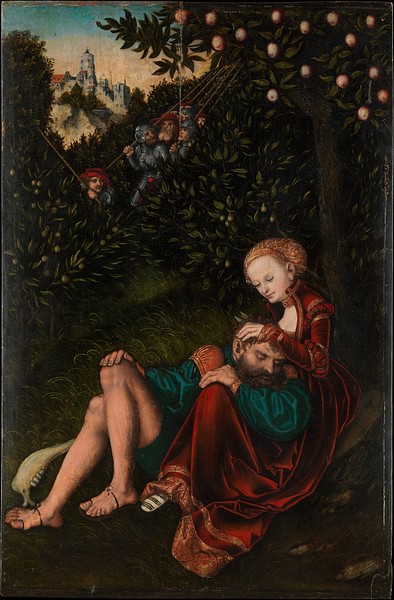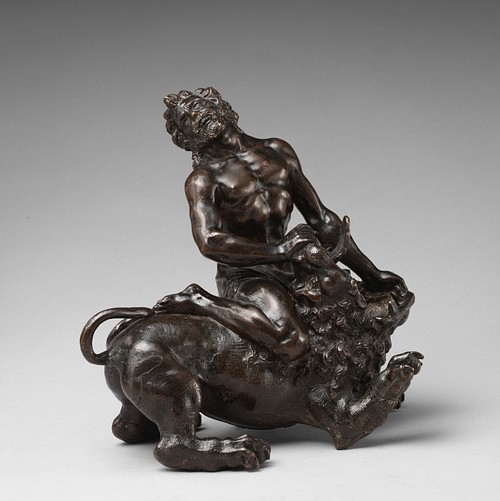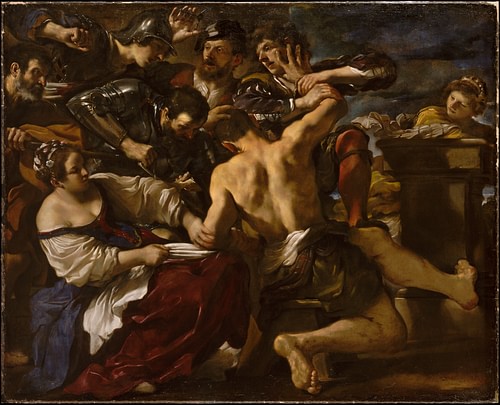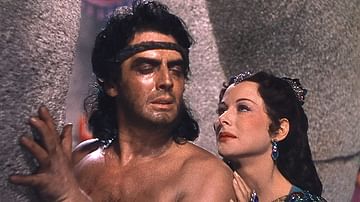
Samson was one of the last judges in the Hebrew Book of Judges who arose as a leader of the Jews when they settled in Canaan. He was a Nazirite, known for his incredible strength, the secret of which was discovered by Delilah who betrayed him to the Philistines.
The Book of Judges
The Book of Judges narrates the time when the Jewish settlement in Canaan was ruled by a tribal confederation, where no one tribe dominated control over the others. The Book of Judges demonstrates a consistent pattern: the Jews fall into idolatry and God punishes them with being oppressed by the Canaanites as well as the Philistines. Known as the Sea Peoples in the region, the Philistines were sea traders who raided and settled in the coastal lands of Canaan around 1100 BCE. In Judges, the Philistines are the consistent enemy of the Israelites. After being punished, the Israelites cry out their sorrow, and God raises up a judge to defeat the current oppressors, thus 'judge' (Hebrew: shofet) in this book was not a circuit, court judge, but someone raised up by the God of Israel during a crisis. After a few years, the Israelites sin again, and the same pattern is repeated until the end of the book.
The story of Samson is told in Chapters 13-16. The writer utilized familiar characters and concepts from Scripture (typology) as well as elements of shared folklore in the ancient world. Other civilizations had legendary tales of folk heroes, such as the Sumerian Enkidu, the Greek Herakles, the Roman Hercules, and Milo of Croton.
The Birth of Samson
A certain man of Zorah, named Manoah, from the clan of the Danites, had a wife who was childless, unable to give birth. The angel of the Lord appeared to her and said, "You are barren and childless, but you are going to become pregnant and give birth to a son. Now see to it that you drink no wine or other fermented drink and that you do not eat anything unclean. You will become pregnant and have a son whose head is never to be touched by a razor because the boy is to be a Nazirite, dedicated to God from the womb. He will take the lead in delivering Israel from the hands of the Philistines." (Judges 13:2-5)
The son was named Samson, "son of the sun." The typology of barren women is found throughout the Hebrew Bible, where barrenness is always cured by the divine intervention of God.
Nazirites
From the Hebrew nazir ("consecrated" or "separated one"), a Nazirite was someone who took a vow to dedicate his life to God for either a short duration or a lifetime. The instructions were found in Numbers 6:1-21:
- A Nazirite must abstain from wine
- During the period of the vow, a razor must not touch the head, letting the hair grow long
- A Nazirite must avoid corpse contamination, even one of his relatives.
The details of Nazirite vows reflect a suspension of normal social conventions, providing an aura of holiness for these men. Most ancient Jews had beards but trimmed their hair (as with many in the dominant cultures). The long hair of a Nazirite would publicly indicate that he was under a vow; not participating in funeral rituals would indicate the same understanding.
Samson’s Marriage
Ironically, Samson does not always act as what we would deem a Jewish holy man. Samson fell in love with a Philistine woman.
...he said to his father and mother, "I have seen a Philistine woman in Timnah; now get her for me as my wife." His father and mother replied, "Isn’t there an acceptable woman among your relatives or among all our people? Must you go to the uncircumcised Philistines to get a wife?" But Samson said to his father, "Get her for me. She's the right one for me." (Judges 14:2)
On the way to Timnah, Samson was attacked by a lion and tore him apart with his bare hands. When he went to Timnah again to complete the marriage ceremony, he saw that bees had built a hive in the carcass and produced honey. Arriving in Timnah, his father arranged the marriage feast, and her clan "chose thirty men to be his companions" (Judges 14:11)

In the ancient world, banquets and feasts included the entertainment of riddle games, which were often part of the drinking games after the meal.
"Let me tell you a riddle," Samson said to them. "If you can give me the answer within the seven days of the feast, I will give you thirty linen garments and thirty sets of clothes. If you can't tell me the answer, you must give me thirty linen garments and thirty sets of clothes." "Tell us your riddle," they said. "Let's hear it." He replied, "Out of the eater, something to eat; out of the strong, something sweet." (Judges 14:12-14)
The companions approached Samson's wife:
"Coax your husband into explaining the riddle for us, or we will burn you and your father's household to death. ... Then Samson's wife threw herself on him, sobbing, "You hate me! You don't really love me. You've given my people a riddle, but you haven't told me the answer."... She cried the whole seven days of the feast. So on the seventh day he finally told her, because she continued to press him. She in turn explained the riddle to her people. ...the men of the town said to him [Samson], "What is sweeter than honey? What is stronger than a lion?" Samson said to them, "If you had not plowed with my heifer, you would not have solved my riddle." (Judges 14:15-18)
"Plowing" with his heifer was a euphemism, an insult indicating sexual activity.
Vengeance on the Philistines
We have a cycle of stories of ways in which Samson took revenge. With the spirit of the Lord upon him, he struck down 30 men and took their clothes. His father-in-law gave Samson's wife to one of the companions. In revenge, Samson caught 300 foxes and tied torches to their tails and then sent them through the grain fields and vineyards. "So the Philistines went up and burned her and her father to death." (Judges 15:6)
The Philistines approached the other tribes for their help in capturing Samson. They agreed so that the Philistines would not blame them for his violence. 3000 Judahites bound Samson, but when the Philistines arrived, "the spirit of the Lord came powerfully upon him" (Judges 15:14) and his bonds were broken and "Finding a fresh jawbone of a donkey, he grabbed it and struck down a thousand men" (15:15).

Samson & Delilah
"Some time later, he fell in love with a woman in the Valley of Sorek whose name was Delilah." (Judges 16:4) Seeing this as an opportunity, the Philistines ordered her to find out the secret of Samson's strength. They told her, "Each one of us will give you eleven hundred shekels of silver" (Judges 16:5). Three times Samson lied to her, but she nagged him until "he was sick to death of it" (Judges 16:16). He told her that if his head were shaved, he would lose his strength. After Samson fell asleep on her lap, she called in the Philistines who shaved his hair and blinded him.
The Philistines placed Samson in one of their grain cells where his hair grew back. Sometime later, they were gathered together to celebrate their god, Dagon. They called for Samson to be brought in front of them so that they could mock him. Samson told the servant who was leading him to place him between two pillars.

Then Samson prayed to the Lord, "Sovereign Lord, remember me. Please, God, strengthen me just once more, and let me with one blow get revenge on the Philistines for my two eyes." Then Samson reached toward the two central pillars on which the temple stood. Bracing himself against them, his right hand on the one and his left hand on the other, Samson said, "Let me die with the Philistines!" Then he pushed with all his might, and down came the temple on the rulers and all the people in it. Thus he killed many more when he died than while he lived. Then his brothers and his father’s whole family went down to get him. They brought him back and buried him between Zorah and Eshtaol in the tomb of Manoah his father. (Judges 16:28-31)
Jewish & Christian Interpretations of Samson
Early Jewish Rabbinic literature blamed Samson's blinding and death on his relationship with an idolater and what became a traditional interpretation of Delilah as a prostitute. Other Rabbis debated if Samson's final act should be understood as an act of suicide or martyrdom.
Christian interpreters considered the story of Samson as a prefiguration of the life of Jesus of Nazareth. Both births were foretold by an angel. Delilah's betrayal was compared to the betrayal of Judas Iscariot, and both were paid in pieces of silver. Samson was insulted and blinded; Jesus was blindfolded and insulted by his guards. Samson extending his hands against the pillars prefigured Jesus' hands on the two beams of the cross.







